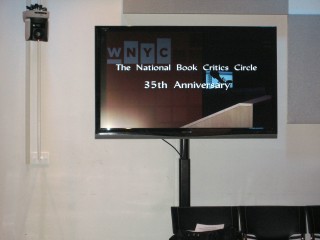Former NBCC board member Kit Reed remembers the ups and downs in the 1990s, as part of her participation in the 35th anniversary celebration at WNYC’s Jerome L. Greene Performance Space.
Of course there were the books—we were all about books, but so many came and went during my four years on the NBCC board that titles blurred. I remember certain standouts: Mark Doty’s “My Alexandria,” “Shot in the Heart,” Mikail Gilmore’s astonishing memoir about his brother Gary; Jane Smiley’s” A Thousand Acres,” all of which won, and one novel in particular, Geoff Ryman’s “Was,” which should have run. A Canadian living in the UK, Ryman was declared ineligible. In the ‘90s, we were limited to books by U.S. citizens.
So there were the books, in jiffy bags and overnight pouches, slithering over the doorstep and piling up on every available surface, all demanding to be mastered before the next meeting.
Before the books, there were the people—for me, at least. I worked alone. Most novelists do. I reviewed to feed my reading habit. Imagine getting paid to read! Then Garret Condon of the Hartford Courant, one of the papers I reviewed for, had me join the NBCC. I had colleagues out there.
At my first meeting I met Alida Becker, who had reviewed me; we liked each other on sight. Newly elected to the board, my friend Tom Disch arrived in an elegant pin-striped suit. He’d bought it especially for the meeting, which I discovered when he stood up to speak. Big white stitches across the vent shouted, NEW SUIT. At that first meeting I thought: wow, it would be fun to sit down with the likes of Tom and Alida and Nina King and… and… Two years in, I ran for the board.
My friend Malcolm Jones maxed out after a year of service, having had enough of what we will, for the moment, call group discussions. I was hardier—about which, more later.
I ran on the stickers. NBCC wanted publishers to sticker award winners. I had them designed and produced and flogged them to publishers; four years later I would hand off the last carton to Bart Schneider. Tom left the board the year I was elected. Starting at the New York Times Book Review, Alida had to recuse herself, but I came to a table filled with smart people who loved books.
There were one or two gadflies but with Herb Leibowitz and then Jack Miles in charge, meetings ran more or less serenely. And they were fun! Hurtling out of a log-jammed cab to sprint across town in time for one meeting, I tripped, kept running but lost a bracelet. Sybil Steinberg consoled me: “You have to think of jewelry as something you have for a little while.”
Michael Dirda told me that as a kid he holed up in his room in Lorain, Ohio, speaking with stones in his mouth, a la Demosthenes; he picked up pronunciations from a Bergen Evans radio show. I hit it off with Ron Sukenick, who later bought a novel of mine for Fiction Collective 2. Another board member who shall remain nameless had a book published that year; then he learned that board members’ titles weren’t eligible for the award. I watched him scurry across the boarding lounge at JFK to phone in his resignation before the plane took off.
There were undercurrents, but meetings were so civil that I convinced the fastidious Peter Prescott, one of NBCC’s founders, to rejoin. He’d quit in a huff some twenty years before—proof that passions mount and meetings do get contentious when books are involved. All went well until the fiction committee met at Daphne Merkin’s apartment. Our sub-group got along fine, but there was a tsimmis. I honestly forget what the fuss was about but we were all in high dudgeon over some procedural thing. End result: Peter quit all over again. We met for dinner after the next board meeting so I could debrief him—not our last dinner, by any stretch. I still miss him.
One year I solicited manuscript pages from award members for sale to benefit NBCC, and a dealer friend bought the lot, which went to Yale: a substantial contribution to the treasury. Each new term on the board brought new friends. And books. And more books. I spent most afternoons and weekends and winter break on the sofa, reading candidates for the awards. It’s a lot of work!
There were job changes among the board members, resignations, a couple of divorces. Time flowed, things changed, along with the management; discussions devolved into psychodrama, with two of the principals duking it out like actors doing Medea in ancient Greece. Retreating to the Coke machine, I told David Ulin that this was new—at least, for me. I’d been elected to a full term but, being hardier than Malcolm but not as hardy as others, I maxed out and stepped down after my fourth year on the board. It was time.


